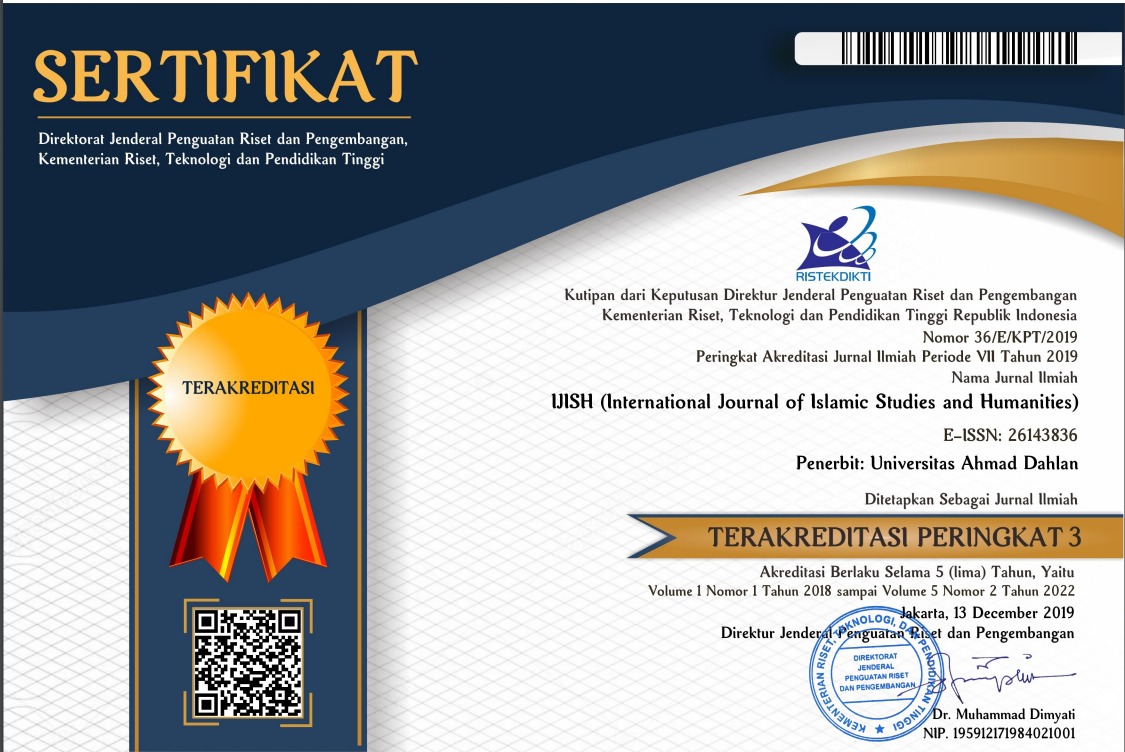Portraying women’s agential practices of ideological muslimah community: a passionate approach to islamist politics
DOI:
https://doi.org/10.26555/ijish.v6i1.7234Keywords:
Agency, Identity , Emotion, Motivation, ActivismAbstract
The issue of women and Islamism has been an increasing area of study to explore considering the number of women subscribing to the ideology continues to rise. Plenty of research has been conducted on this subject, but those available suggest that women were fragile victims of the ideology and were portrayed as passive actors who enact no agency. As we shall see, this research finds the opposite. Exploring the motivation and activism of the Ideological Muslimah community in Yogyakarta through a passionate politics approach, it discovers the agential practices of women in Islamist movement. Their motivation and engagement in Islamist politics demonstrate pluralities of women’s experiences and affirm the strong nexus of agency, emotion, and identity. By focusing on the agency and the play of emotion, this article aims to provide an alternate perspective to the burgeoning study of feminism and social movement, which has thus far been dominated by rational calculation of the action.
References
Abu Hanieh, H. (2008). Women and Politics: From the Perspective of Islamic Movementd in Jordan. Friedrich Ebert Stiftung.
Abu-Lughod, L. (2013). Do Muslim women need saving? Harvard University Press.
An-Nabhani, T. (1990). The Social System in Islam. Al-Khilafah Publication.
Aslam, M. (2014). Islamism and masculinity: Case study Pakistan. Historical Social Research/Historische Sozialforschung, 135–149.
Ayoob, M. (2008). The Many Faces of Political Islam: Religion and Politics in the Muslim World. University of Michigan Press.
Azca, M. N. (2011). After jihad: A biographical approach to passionate politics in Indonesia.
Bahramitash, R., & Esfahani, H. S. (2011). Veiled employment: Islamism and the political economy of women’s employment in Iran. Syracuse University Press.
Berry, D. L. (2003). Islam and modernity through the writings of Islamic modernist Fazlur Rahman. In Islamic studies. Edwin-Mellen Press.
Bouras, N. (2017). From Salafi Preaching to Political Preaching: Women’s Turnout and the Evolution of Salafi Movements in Egypt. GENDER–Zeitschrift Für Geschlecht, Kultur Und Gesellschaft, 9(1), 9–10.
Britain, H. ut-T. (2010). The Draft Constitution Or The Necessary Evidences for It. Hizbut-Tahrir.
Butler, J. (1999). Gender Trouble: Feminism and the Subversion of Identity. Routledge.
Clare, S. (2009). Agency, signification, and temporality. Hypatia, 24(4), 50–62.
Davis, J. (2006). Women and Radical Islamic Terrorism: Planners, Perpetrators, Patrons? Issued by the Canadian Institute for Strategic Studies.
Duriesmith, D., & Ismail, N. H. (2019). Militarized masculinities beyond methodological nationalism: charting the multiple masculinities of an Indonesian jihadi. International Theory, 11(2), 139–159.
Duriesmith, D., & Ismail, N. H. (2022). Masculinities and Disengagement from Jihadi Networks: The Case of Indonesian Militant Islamists. Studies in Conflict & Terrorism, 1–21.
Dyer, E. (2016). Women and The Caliphate: Women’s Rights and Restriction in Islamist Ideology and Practice (Policy Paper No. 7). Centre for the Response to Radicalisation and Terrorism.
Dzuhayatin, S. R. (2020). Islamism and nationalism among niqabis women in Egypt and Indonesia. Indonesian Journal of Islam and Muslim Societies, 10(1).
Fauzi, N. A. F. (2017). Fatwa di Indonesia : perubahan sosial, perkembangan, dan keberagaman. 8(1), 108–121.
Franks, M. (2001). Women and Revivalism in the West: Choosing Fundamentalism in A Liberal Democracy. Palgrave.
Goodwin, J., Jasper, J. M., & Polletta, F. (2009). Passionate politics: Emotions and social movements. University of Chicago Press.
Gould, D. B. (2004). Passionate political processes: Bringing emotions back into the study of social movements. Rethinking Social Movements: Structure, Meaning, and Emotion, 155–176.
Gray, D. H. (2012). Beyond feminism and Islamism: Gender and equality in North Africa. Bloomsbury Publishing.
Women and Terrorism: Hidden Threat, Forgotten Partners, Council on Foreign Relation (2019).
Karam, A. (1997). Women, Islamisms and the State: contemporary feminisms in Egypt. Springer.
Komara, F. (2016). Menjadi Muslimah Negarawan. Cetakan Kedua. Sukoharjo: Granada Publisher.
Lillevik, R. (2012). Islamist Women and Political Rights: A Case Study of Islamist Women’s Increasing Political Participation in Egypt's Muslim Brotherhood.
Mahmood, S. (2011). Politics of piety: The Islamic revival and the feminist subject. Princeton University Press.
Marcoes, L. (2022). Seperti Memakai Kacamata yang Salah: Membaca Perempuan dalam Gerakan Radikal. Afakaruna.id.
Mohammad, R. (1999). Marginalisation, Islamism and the Production of the’Other's''Other'. Gender, Place and Culture: A Journal of Feminist Geography, 6(3), 221–240.
Mujahidudin, M. (2012). Women’s political role in islamic fundamentalism (case study of hisbuttahrir indonesia). Sulesana: Jurnal Wawasan Keislaman, 7(2), 1–12.
Nuryana, Z. (2017). Knowledge Management sebagai Upaya Pengembangan Learning Organization di Lembaga Pendidikan Islam. LITERASI Jurnal Pendidikan, Volume VII, 12–20. https://doi.org/http://dx.doi.org/10.21927/literasi.2017.8(1).11-19
Omayma, A., & Ottaway, M. (2007). Women in Islamist Movements: Toward an Islamist Model of Women’s Activism. Carnegie Papers (2), 3–13.
Rahman, A. (2016). Reformasi dan Arah Pembaharuan Pendidikan Islam Arif Rahman. Literasi, VII(2), 75–88.
Rohmaniah, I. (2020). Sholihah Demi Khilafah: Perempuan dan Gerakan dan Ideologi Politik Hizbut Tahrir Indonesia. Lampu Merapi dan Mirra Buana Media.
Widani, A. (2017). Gender Equality and Women’s Participation in Islamic Fundamentalist Groups: A Case Study of Indonesia. University of Oslo.
Downloads
Published
How to Cite
Issue
Section
License
Copyright (c) 2023 Maurisa Zinira, Wening Udasmoro, Muhammad Najib Azca

This work is licensed under a Creative Commons Attribution-ShareAlike 4.0 International License.
Authors who publish with IJISH (International Journal of Islamic Studies and Humanities) agree to the following terms:
- Authors retain copyright and grant the journal right of first publication with the work simultaneously licensed under a Creative Commons Attribution License (CC BY-SA 4.0) that allows others to share the work with an acknowledgment of the work's authorship and initial publication in this journal.Â
- Authors are able to enter into separate, additional contractual arrangements for the non-exclusive distribution of the journal's published version of the work (e.g., post it to an institutional repository or publish it in a book), with an acknowledgment of its initial publication in this journal.
- Authors are permitted and encouraged to post their work online (e.g., in institutional repositories or on their website) prior to and during the submission process, as it can lead to productive exchanges, as well as earlier and greater citation of published work.

This work is licensed under a Creative Commons Attribution-ShareAlike 4.0 International License.






